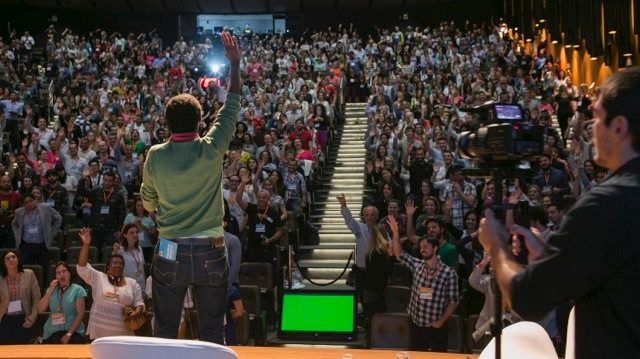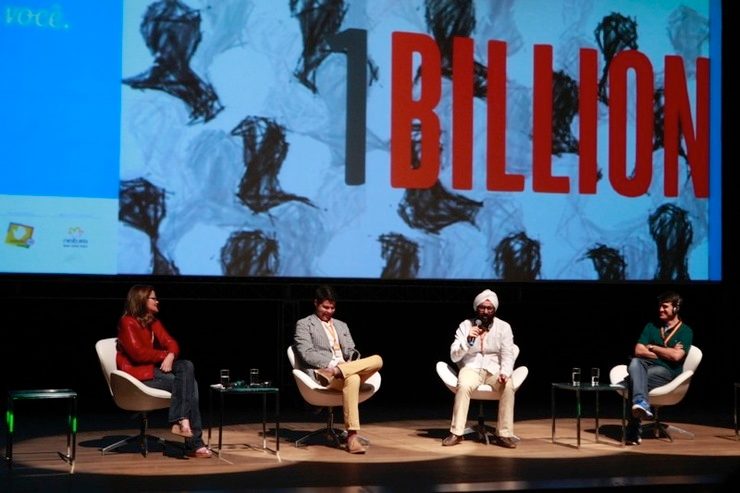SUMMARY
This is AI generated summarization, which may have errors. For context, always refer to the full article.

FLORIANOPOLIS, Brazil – The third edition of the Social Good Brazil Summit, the biggest event on innovation for social change in Brazil took place on November 5-6 in Florianópolis.
The city is a beautiful island in the South of Brazil and it is well known not just for its beautiful beaches but because it is a center of technology and one of the country’s most attractive cities for entrepreneurs. The summit gathered 1,200 thousand people in the theater and 10,100 thousand online followers via the livestream.
With the title “Innovation + Protagonism: the new tool for change is you,” the event put together 24 Brazilian panelists and 8 international speakers in a global discussion on how technology, new media and innovative thinking can help to solve social challenges in 10 panels.
For the international friends that could not follow the event at the time, the videos of all panels translated into English are available online in a playlist to be accessed on our YouTube channel.
Here are the main insights of each conversation:
Tools for social change: social good and you
Every one of us has more power than ever to change reality for the better. Robert Skinner from the United Nations Foundation highlighted that, thanks to technology, important conversations and connections are happening. “People are uniting globally to make a change. We see young people identifying social problems in their countries and working together to solve them.”
A new collaborative economy: Thinking, being, and acting in network
How is new collaborative economy to be understood and how is it used? The innovation we want for the future is profoundly based in communities and network connections. Oswaldo de Oliveira, fom Laboriosa89 sees a new behavior: “there is a path for everybody without hierarchy.
The industrial society simplifies the power of every human being. In a distributed environment this is very different”.
Digital campains and new volunteering, technology strengthening the social protagonism

How can digital activism have a concrete impact on society? The panelists, who were the finalists from the competition ‘Ideas that go far,’ represent three important movements in Brazil on diverse themes.
From the approval law that would include oral chemotherapy in the health system to riding bikes to get to work, one good conclusion: to create more creative and humane cities and networks: we can’t forget what the cities and networks are: they are people.
New forms of civic engagement: The new connected citizens
How are technologies giving voice and facilitating the citizens’ active participation? In Brazil, the power of internet to mobilize has never been as clear as it was in the riots and manifestations of June 2013, where more than 1 million people took to the streets.
Technology and new media empowered people giving them ways to practice citizenship without intermediaries. It can even create fun and creative ways to engage people and make politics fun. And happy people are able to do anything better.
New journalism strengthening democracy
New media and networked society cause a revolution in the way we communicate. Anybody can produce tools necessary for generating and consuming information. How does this process contribute to democracy?
The internet is rescuing journalism. The professionals are rediscovering the desire to change the world thru information. For panelist Tomás de Lara, “in journalism, autonomy is a synonym of quality” and thanks to the internet, journalism can regain control of itself.
Protagonism and rescuing creativty
Robert Skinner was the moderator from the UN foundation. He summarized the professional performance of the panelists with perfection: “creating decisions together with the people and hearing them is fascinating. It’s possible to co-create solutions together with people from socially marginalized communities.”
Dayna Cunningham from MIT CoLab said that “kids with baseball caps and hoods from the Bronx can tell you about and give you suggestions for institutional changes and creating wealth. They just lack a space to discuss and create solutions.”
Entrepreneurship + technology and social innovation around the world
Three examples of global initiatives that accelerate new entrepreneurial models were on the summit’s stage: Singularity University (SU), Global Social Benefit Incubator (GSBI) and Socialab. The integration between all the institutions involved (people, government and the academy) is a great way to co-create innovation. Passion and empathy to solve problems were also mentioned as important to a social entrepreneurship system.
Technology and impact in education
What are the challenges that hinder the creation of an innovative educational model, integrated to the possibilities the technology provides? Innovation is necessary not only to improve quality, but also to democratize the access to information and the education. A new ecosystem is related to the efficient capacity building of the teachers: “We can only innovate after adopting a mindset that searches for innovation”.
Innovative non-profits: Reinventing the third sector
The innovation movement has also reached the nonprofits, which are bringing in new principles, methods, tools and new media to increase the positive social impact of their actions. We live in the era of “voluntivism”: a mix of volunteering and activism. Since internet and new media are tools for activism, everything change and gain scale. The conversations that happen online can even influence the planning of the NGOs.
Technology and new media enabling the scale up of solutions to social problems
Well known experts on design thinking and innovation, Aaron Britt (IDEO.org) and Sartaj Anand (Egomonk) were invited to share their experiences. Aaron Britt said that is impossible to solve a problem without talking to who is living it. Sartaj Anand believes in a great future, driven by exponential technology.
The conclusion is that all of us can be protagonists of change. We hope the Social Good Brazil Summit 2014 has inspired you to work to find the solutions for the most difficult global challenges. Keep connected with us. – Rappler.com
Bibiana Beck is the Social Innovation Blog Editor of Social Good Brazil.
Add a comment
How does this make you feel?
There are no comments yet. Add your comment to start the conversation.